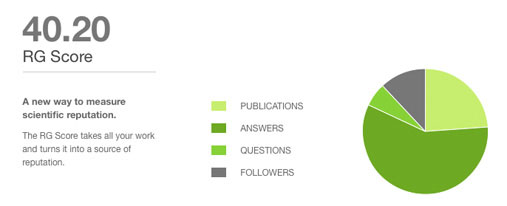ResearchGate: an alternative to traditional publishing?
22 Aug, 12 | by BMJ
ResearchGate, a Q&A site that soon became known as ‘Facebook for scientists‘, has announced its intention to function as a publishing platform for scientific researchers and offer an alternative measure of reputation in that community.
Started in 2008 with few features, ResearchGate was reshaped with feedback from scientists and has attracted several million dollars in venture capital from some of the original investors of Twitter, eBay and Facebook. According to the website, more than 1.9 million scientists currently share papers, publish data and engage in discussions on its platform. Now an ‘RG Score’ has been designed to make those interactions visible and quantifiable.
The site has been described as “a mash-up of Facebook, Twitter and LinkedIn“, with profile pages, comments, groups, job listings, and ‘like’ and ‘follow’ buttons. Users can also create public or private discussion groups, and share papers and lecture materials.
In fact, ResearchGate offers an easy way to get around journal access with a ‘self-archiving repository’. With most publishers allowing authors to link to their papers on a personal website, ResearchGate encourages its users to do so on their ResearchGate profiles, thus opening up access to other members of the site.
The RG Score, launched this month, is determined by community members’ interactions with content, as well as how frequently interactions occur, and who interacts with what. The ResearchGate scoring system apparently works alongside the traditional reputation model and the company hopes that it will be useful to scientists just starting out on their career. Perhaps not surprisingly, the user base has a large number of younger academics. “The average age for users is 27, with younger researchers more active in asking questions and older ones treating it more as an alternative resume.”
ResearchGate’s vision also includes more open publication of data.
Whether raw, negative or inconclusive data, there are no restrictions on what a researcher can publish on ResearchGate, or on what can become a factor in their RG Score. Not only does this help researchers receive credit for all their work, it also ensures absolute transparency across the entire research process. ResearchGate co-founder and CEO Dr. Ijad Madisch points out the need for a system that gives science back to the research community: “The RG Score allows real-time feedback from the people who matter: the scientists themselves.”

